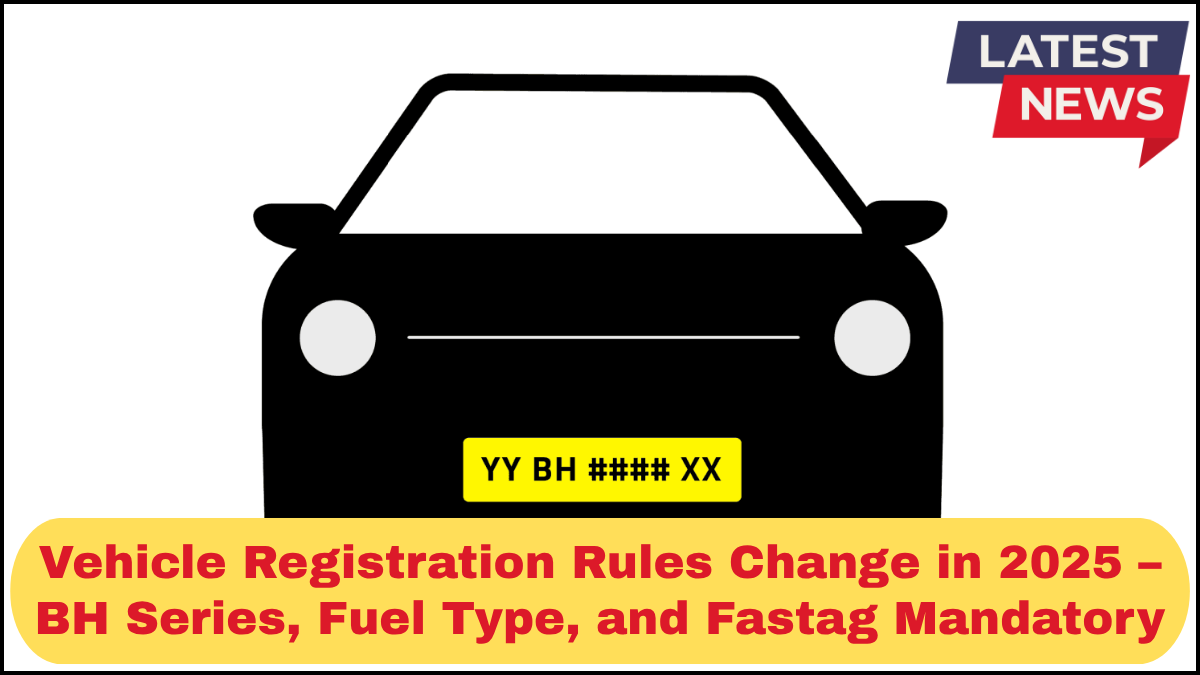The road transport landscape in India is undergoing a major transformation with the introduction of the new vehicle registration rules in 2025. These changes are designed to streamline processes, encourage uniformity across states, and push for more transparency and efficiency in vehicle management systems. The Ministry of Road Transport and Highways (MoRTH) has rolled out significant updates impacting vehicle buyers, automobile dealers, and transport authorities alike.

Let’s break down the major updates you need to know.
BH Series Now Extended to More Vehicle Owners
One of the most impactful elements of the 2025 vehicle registration changes is the expansion of the BH (Bharat) series registration facility. Initially launched in 2021, the BH series was limited to central and state government employees, defense personnel, and certain private sector employees working in organizations with offices in multiple states.
What’s New in 2025:
-
The eligibility criteria have been broadened to include self-employed professionals, gig workers, and employees in smaller firms with cross-state operations.
-
The aim is to make interstate vehicle movement hassle-free without the need for re-registration when relocating.
-
Vehicles with BH series plates will pay road tax in two-year blocks, rather than the traditional lump-sum method for 15 years. This system is now digitized for ease of use.
Why It Matters:
This move supports India’s increasingly mobile workforce and makes relocation much smoother for working professionals. It also aligns with the broader goal of a more unified national vehicle registration system.
Fuel Type Declaration Now Mandatory
Starting January 2025, declaring your vehicle’s fuel type will no longer be optional during registration — it’s now a mandatory requirement.
Key Highlights:
-
Fuel type declaration (Petrol, Diesel, CNG, EV, Hybrid, etc.) must be explicitly recorded at the time of registration.
-
The government aims to use this data to build accurate records that can help with future environmental policies and emission tracking.
-
Different states may introduce variable registration charges based on the fuel type, giving a financial edge to electric and hybrid vehicle owners.
Implications:
This change nudges consumers toward greener mobility options. For example, EVs and hybrid cars may continue to enjoy reduced registration fees, subsidies, or toll exemptions as part of various state-level green mobility schemes.
FASTag Made Mandatory for All Registered Vehicles
Another major update in the new vehicle registration rules is the universal mandate of FASTag for all new registrations starting in 2025.
What You Need to Know:
-
All newly registered vehicles will be required to have FASTag enabled before leaving the dealership.
-
Existing vehicles without FASTag will face increased scrutiny at toll plazas and may be penalized under non-compliance.
-
FASTag integration will now be part of the Vahan database, linking toll payment history with vehicle records.
Benefits of FASTag Enforcement:
-
Faster toll collection and less congestion at toll booths.
-
Real-time tracking of toll payments and improved transparency.
-
Reduced operational costs for highway management authorities.
This rule strengthens the government’s digital infrastructure push and aims to make India’s highway toll system more efficient and seamless.
Additional Measures in the 2025 Update
-
Digital Documentation: Paper-based registration certificates will gradually be phased out in favor of digital RCs accessible via DigiLocker or the mParivahan app.
-
Centralized Database Synchronization: All regional transport offices (RTOs) will now be required to update data in real-time to a central database, minimizing fraud and data inconsistencies.
-
Dealer Point Registration: Automakers and dealers can now register vehicles directly through an online portal, cutting down on time and paperwork for buyers.
FAQs
Q1: Who is eligible for the BH series number plate in 2025?
As of 2025, eligibility has been expanded to include private-sector employees, freelancers, and individuals working for firms with operations in more than one state, along with government and defense personnel.
Q2: Is fuel type declaration necessary for all vehicles?
Yes. Fuel type must be clearly stated at the time of registration. This applies to all vehicle categories, including two-wheelers and commercial vehicles.
Q3: What happens if my vehicle does not have a FASTag?
Vehicles without FASTag will not be allowed to complete the registration process post-2025. Existing vehicles may face fines or restrictions when crossing tolls without a FASTag.
Q4: Will the new registration rules affect the cost of buying a vehicle?
Possibly. Factors such as fuel type and BH series tax structure may influence the total cost. EVs and hybrids may enjoy incentives, whereas conventional fuel types could face higher charges.
click here to learn more